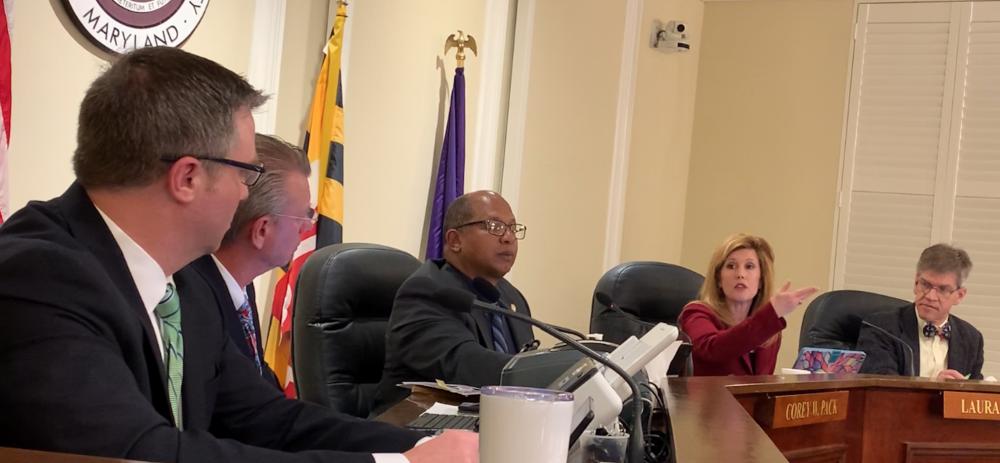The county council voted 3-0 Tuesday night to support a proposed amendment to the Kirwan education legislation that would consider a county’s median household income as a factor in determining state funding for that county’s schools.
Talbot officials have complained for years about the state’s education funding formula, which gives extra weight to a county’s assessed property value. With miles of waterfront property, Talbot is considered a relatively wealthy county and receives less state funding for its schools as a result.
HB 1300, which has been approved by the Maryland House of Delegates and is being considered in Senate committees, provides for the implementation of the Kirwan commission’s recommendations, the Blueprint for Maryland’s Future.
Councilwoman Laura Price said Shore delegates had sought to have the bill amended to include median household income as a factor, but those attempts had failed.
“We’ve all talked for 10 years or so about the wealth formula being unfair to counties like Talbot, Kent, Worcester, who might have high property values,” she said.
An amendment planned to be introduced in the Maryland Senate would require the state to consider median household income for any additional funding required under Kirwan.
“Talbot County is 18 percent below median income,” Price said, noting the change, if approved, would mean additional state funding for the county’s public schools.
“It would give more state dollars to Talbot County and similar counties so that we don’t have to foot the whole bill,” she said. “The price tag between the state and the county stays the same, but the difference is instead of Talbot County having to foot about 75% of the bill, we would get additional state dollars which is what we’ve been talking about for years.”
Councilman Frank Divilio agreed that the county had been seeking additional state funding for education for some time.
He suggested a work session with the school board and school officials, but Price noted that the legislation likely would be approved before such a session could be scheduled.
“As far as the funding policy, all I’m asking for tonight is just support a bill that gives us more state aid,” Price said. “And I can’t imagine that you wouldn’t be supportive of an amendment being offered that would help counties like Talbot with more state aid.”
Councilman Pete Lesher agreed.
“There’s widespread acknowledgement that what we’re doing in education needs to change,” Lesher said. “Maryland has commissioned an expert panel that has laid out a plan. And really the controversy in this is not what needs to be done, how to go about this, the controversy is really entirely about how to pay for it.
“What Mrs. Price has been offering here and following very closely is that part of the legislation that has to do — not so much the content of what we need to do to fix education in Maryland and to become a leader among states in this — but really how to figure out how to pay for it, how to apportion those costs appropriately and in particular how those costs should be apportioned to the county,” he said. “If the funding formula could be adjusted in a way that does not land so heavily on Talbot County that seems to be something we ought to support.”
Price noted that the position of the Maryland Association of Counties (MACo) had been that any additional funding required as a result of Kirwan recommendations should be paid entirely by the state.
“Our only resource is to raise property taxes and the numbers after it passed on Friday are $69 million by 2030 for Talbot County, which is a 40 cent increase in the property tax rate,” she said. “This amendment could mean millions of dollars additional in state aid … rather than having to put it squarely on our citizens’ backs to pay for it. We’re still going to have to go up quite a bit.”
Council President Corey Pack said he would abstain from voting on the issue since he has not seen the amendment.
Price said amendments have to be considered in committee first “before you see the language.
“So you don’t support getting additional state aid, we heard you,” she said.
“Do you or do you not support a median household income adjustment that would give us more state dollars? Price asked. “Yes or no, that’s all we need to say.”
“I’m not in a position to vote tonight,” Pack said. “If others are, that’s fine, we have a second to the motion.”
Divilio, Price and Lesher voted to send a letter supporting a median household income amendment to HB1300; Pack and Vice President Chuck Callahan abstained.



Leslie Steen says
This article is excellent. Thank you for informing us. Now can someone explain how/why the vote was 3 to 0 as opposed to 5 to 0? How can we have two Council Members who cannot support this approach to the State funding formula. What am I missing? Doesn’t this benefit all Talbot County residents? What did they fear? What didn’t they understand?
Alan Boisvert says
Something has to give. Most people cannot afford a 40% increase. I’m beginning to think the State legislatures are all morons.
If property taxes go up 40%, there’s going to be an awful lot of forced tax sales while Talbot real-estate prices plummet. Thank you Talbot County Council, especially Laura Price!